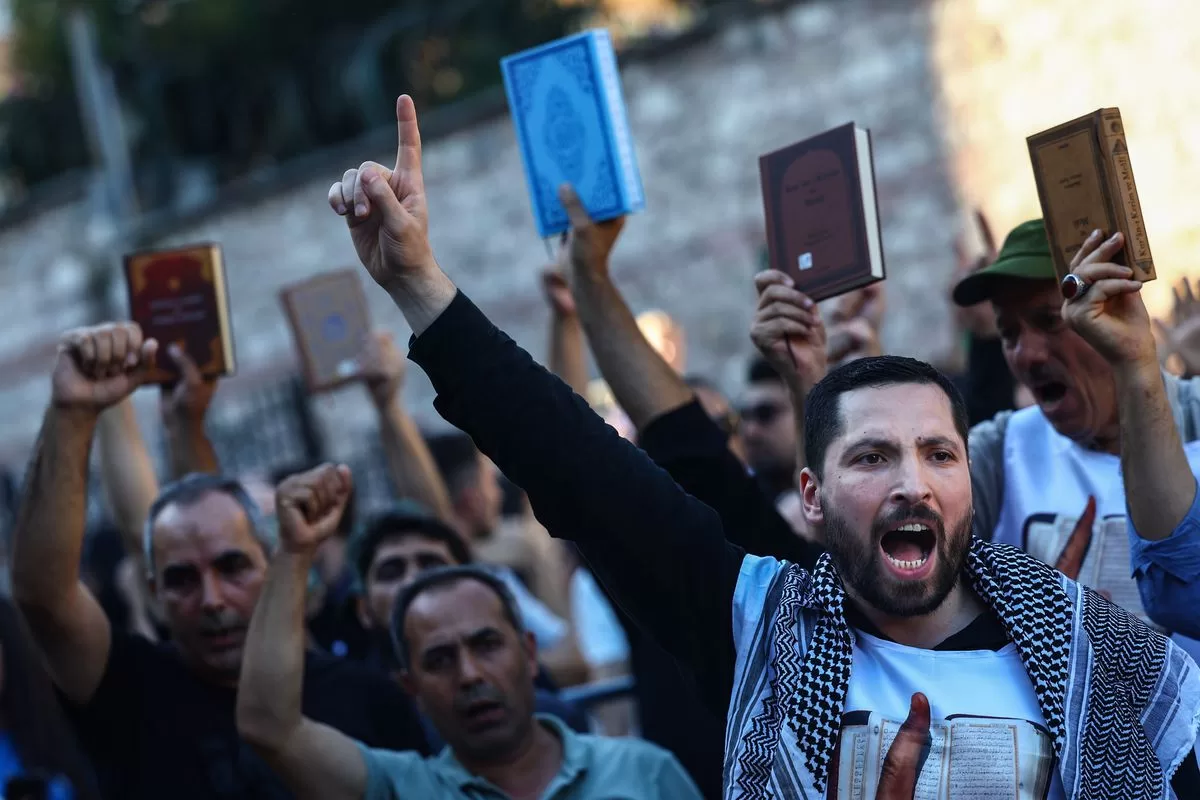The foreign ministers of the 57 countries that make up the Organization of Islamic Cooperation (OIC) met in an emergency on Monday to show their rejection of the burning of several copies of the Koran in Sweden and Denmark in recent weeks and advocated adopting measures to respond to these acts of protest. This same Monday, two men, one of them an Iraqi refugee, staged another burning of a Koran in Stockholm, in front of the Swedish Parliament. The governments of the two Scandinavian countries have announced that they are seeking legal means to limit future actions of this type after the social and diplomatic uproar they are causing in the Islamic world.
The meeting of the OIC, which brings together states with a Muslim majority or with a large population professing that religion, has been held after last week a Danish far-right group burned several copies of the Koran in front of the embassies of Iraq, Turkey , Egypt and Pakistan in Copenhagen. At the end of June, the same Iraqi refugee who has held a protest on Monday, Salwan Momika, burned another copy in front of the central mosque in Stockholm on the first day of one of the two main festivities in the Islamic calendar, the Feast of Sacrifice. In January, a far-right politician burned another copy near the Turkish embassy in the Swedish capital.
This chain of actions has generated great turmoil in the Islamic world. In the last month, there have been demonstrations in countries like Iran and Iraq against the alleged permissiveness of the Danish and Swedish authorities in the burning of copies of the Koran. In Baghdad, protesters even attacked and set fire to the Swedish Embassy in mid-July. In addition, some countries have announced the withdrawal of their ambassadors from Sweden and have asked for explanations, or have directly expelled those in charge of their diplomatic missions in their respective territories.
The Swedish and Danish governments, for their part, have tried to strike a balance between respecting their countries’ religious minorities, placating the outrage these actions have caused, and defending freedom of expression. After the burning of a copy of the Koran near the Turkish Embassy in Stockholm in January, Swedish police turned down further requests for similar protests, but a court overturned the authorities’ decision based on rules that guarantee freedom of assembly. In the case of Sweden, this type of action has strained the relationship with Turkey just as both were negotiating the accession of the Scandinavian country to NATO.
Since then, both countries have defended granting permits to these protests under the law, while distancing themselves from the burnings and pointing out that they are individual acts. They have also advanced that they explore legal avenues that limit these calls. On Sunday, the Copenhagen government stressed that they play into the hands of extremists and are a “provocation that hurts many people.” “Denmark supports the right to protest, but insists that it must continue to be peaceful,” added the Executive, who also considers that they pose a security problem for the country. Stockholm has also stated that it will examine its regulations to give the police the option of avoiding these types of demonstrations if they threaten security.
The OIC session, formally convened by Saudi Arabia, which currently holds the rotating presidency of the organization, also takes place after its executive committee met in early July and called for a high-level emergency meeting to discuss measures collective protests against the burning of copies of the Koran. During the opening session of the meeting held on Monday, the Saudi Foreign Minister, Faisal Bin Farhan, said that the burning of copies of the Koran are “provocative” actions that are not acceptable “under any pretext” and cannot be relied on. freedom of expression. He also called, as did the General Secretary of the OIC, Hissein Ibrahim Taha, to adopt joint measures against this type of act.
Join EL PAÍS to follow all the news and read without limits.
subscribe
As part of this diplomatic activity by countries of the Islamic world, last Tuesday the UN General Assembly adopted a resolution that considers that actions against religious symbols, including books, constitute a violation of international law. The representative of Spain, on behalf of the European Union, unsuccessfully tried to amend the key part of the text, alleging that this type of act is offensive and disrespectful, but does not represent a violation of international law. Likewise, in mid-July the UN Human Rights Council approved another motion on religious hatred and intolerance that called for adopting measures to prevent and prosecute acts that incite discrimination, hostility or violence. The US and the EU also rejected the motion because of its free speech implications.
Follow all the international information on Facebook and Twitteror in our weekly newsletter.
Subscribe to continue reading
Read without limits






